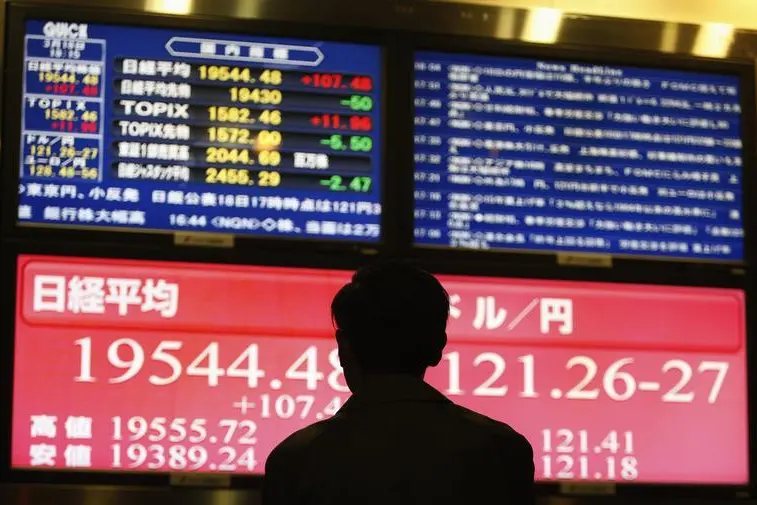PHOTO
- Markets turn bearish on trade fears
- Oil prices recover after supply-related sell-off
- Mideast markets tread water despite positive bank earnings announcements
- Spot gold gains 1.49% on Wednesday as investors seek security
Global markets
Asian stocks fell in early trading on Thursday, reflecting a decline in equities on exchanges in the United States on Wednesday, as early signs emerged that the trade dispute between the world's two biggest economies is affecting corporate earnings.
MSCI's broadest index of Asia-Pacifc shares excluding Japan was down by 0.18% by 06.50 GST on Thursday, while the Nikkei 225 index dropped 1.6%. Japanese exports fell 6.7% in June, according to Reuters, and a Reuters Tankan survey showed confidence among manufacturers has hit a three-year low as concerns grow about the damage that rising protectionism could inflict on the country’s export-led economy.
All three major U.S. market indices closed lower on Wednesday, with the S&P 500 falling by 0.7% and the Dow Jones Industrial Average dropping 0.4% due to fears over the ongoing trade dispute. The Nasdaq Composite index also declined by 0.5%.
U.S. President Donald Trump had threatened earlier in the week to reimpose $325 billion worth of tariffs on Chinese goods which were halted following last month's G20 meeting. The Wall Street Journal also reported on Wednesday that trade talks between the U.S. and China had stalled. The report stated that despite an agreement at last month’s G20 meeting in Japan between leaders of the two countries to resume talks, no meetings had subsequently either taken place or even been scheduled, with U.S. restrictions on Chinese technology firm Huawei seen as a key sticking point.
In a note published on Wednesday, Han Tan, a market analyst at forex broker FXTM, said: "Investors who are hopeful of a U.S.-China trade deal in the near-term have once again been reminded of the tremendous gulf that persists between the world’s two largest economies. The path towards correcting U.S.-China trade imbalances is still unclear, while the risk of more tariffs being placed on global trade remains on the table."
Tan said that even without the imposition of new tariffs, "the ill-effects from the existing tariffs are already being felt in the global economy, as further evidenced by the dismal data out of key Asian economies in recent days".
"Should President Trump indeed impose more tariffs, it is expected to derail global growth while shattering the still-fragile market sentiment," he added.
Middle East markets
There was little movement on Gulf markets on Wednesday. the Dubai Financial Market was pushed 0.23% lower as Emaar Properties fell 1.23%. Dubai Islamic Bank, which yesterday reported a 14% increase in second quarter profit, saw its shares edge up by 0.19%.
The Kuwait Premier Market index closed 0.19% higher and is up 28.5% so far this year as investors have poured money into the market following confirmation last month that index compiler MSCI would upgrade the country’s stock market to emerging market status. Following yesterday's close, lender Kuwait Finance House announced a 13.1% year-on-year increase in half-year profits.
Markets in Abu Dhabi, Bahrain and Saudi Arabia were largely flat, the Qatar Stock Exchange index closed 0.12% higher and the Muscat Securities Market fell 0.25%, dragged down by the performance of its banks. National Bank of Oman shares dropped 1.27% and Bank Muscat Shares finished 0.49% lower.
Oil prices
Oil prices recovered on Thursday morning, with Brent Crude futures trading 0.35% higher at 07.51 GST at $63.88 per barrel, and WTI futures 0.08% higher at $56.86 per barrel. Oil futures had fallen sharply on Wednesday, with Brent crude closing 1.1% lower and WTI futures falling 1.5% after figures released by the U.S. Energy Information Administration showed a significant increase in stockpiles of refined products, despite a bigger-than-expected drawdown of crude oil supplies.
Stephen Innes, managing partner at Vanguard Markets told Reuters that “gasoline consumption is painfully weak given U.S consumers are in peak driving season”.
Precious metals
Gold prices pulled back slightly on Thursday morning after a rally on Wednesday pushed the yellow metal higher as investors sought safe haven assets.
Spot gold was trading at $1,422.59 per oz at 08.00 GST on Thursday morning, having closed 1.47% higher at $1,426.60 per oz on Wednesday.
Currencies
The U.S. dollar index, which measures the greenback against a basket of six major currencies, was trading down 0.12% at 08.08 GST on Thursday morning. The dollar had risen in trading on Wednesday as data on retail sales came in stronger than expected.
The British pound continued a modest recovery against the U.S. dollar in early trading on Thursday, trading at $1.2437. Sterling has endured a continued slide in recent weeks and is trading 5.6% lower than its three-month peak of $1.3171 in early May as fears have grown that the United Kingdom will crash out of the European Union later this year without securing a new trade deal.
(Writing by Michael Fahy; Editing by Mily Chakrabarty)
Our Standards: The Thomson Reuters Trust Principles
Disclaimer: This article is provided for informational purposes only. The content does not provide tax, legal or investment advice or opinion regarding the suitability, value or profitability of any particular security, portfolio or investment strategy. Read our full disclaimer policy here.
© ZAWYA 2019





















